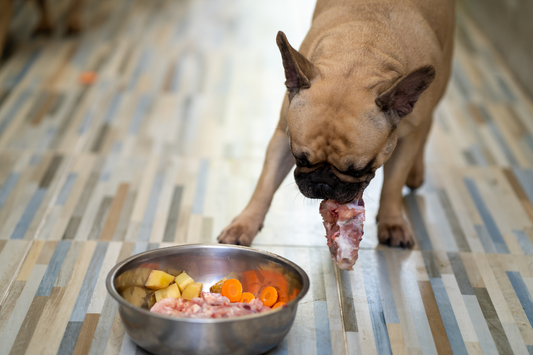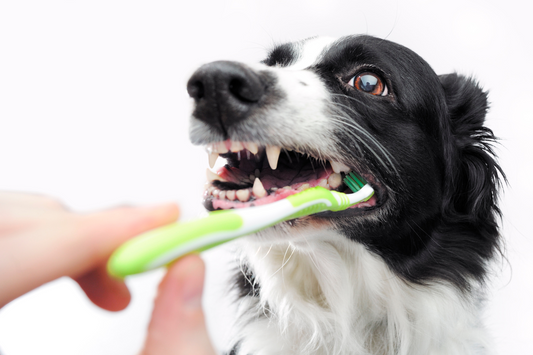Congratulations - you have just become a new fur parent and you’re doing your best to do things right. You have checked all the boxes - puppy clothes, bed, vet schedules, sleeping routines. There’s one thing you are not so sure about yet - the best puppy food.
With all the available options in the online and offline markets, it is easy for first-time puppy owners to find the best food to give to puppies. In fact, the puppy diet and how to do it right is one of the struggles of new puppy owners. Gone are the days when feeding puppies didn't take too much thought; right now, providing the best nutrients from the time your pet is ready for solid food is essential in paving the way for healthy growth.
Puppy Feeding Timeline: What Your Puppy Needs At Different Stages
The first 52 weeks of your puppy’s life is a time comparable to the first 12 years of a child - they experience growth at a tremendous rate! Around this time, ensuring your pet receives the age-appropriate nutrients can help prevent malnourishment issues such as stunted growth, feebleness, and immune system deficiencies.Here’s a timeline of feeding puppies, and what feedings look like at different stages.
Birth to 6 Weeks
During the first 4-6 weeks of a puppy’s life, they are solely dependent on mom’s milk. If mom is not available to feed, you can opt to give replacement formulas using a bottle, or a feeding tube.
When it comes to how much feeding a newborn puppy should do, the general recommendation is 8 feedings per day in the first week, and five feedings a day in the following weeks.
6-12 Weeks
Puppy feeding for 6-12 weeks now includes solid dog food. For small dogs, you can start introducing food by week 11 or 12, and week 9 or 10 for bigger breeds. Pet owners should remember to go for specially formulated puppy food over dog food for adult pets. Opting for adult dog food may rob your little puppy of the most essential nutrients needed for optimal growth. Start by transitioning to four feedings per day.
3-6 Months
Around this time, your puppy will start to shed off their baby fat to prepare for a less-pudgy body. Consider cutting feeding frequency into three.
6-12 Months
By this time, you can now slowly move into adult dog food. But don’t be in a hurry, fur mom and dad - there’s no need to move into big dog food immediately. For bigger dogs, you can start introducing adult dog food by the 8th month. For teacup and toy puppies, you can make the switch by the 13th month.
What Nutrients to Look for in a Puppy Food
Finding the best puppy diet for your little furball can provide the following benefits such as:
-
Optimum growth (not too fast, not too slow)
-
Prepare their immune system for diseases and health issues.
-
Reduce risk of obesity
-
Increasing muscle development
-
Prevent potential orthopedic and musculoskeletal issues.
Puppies need nutrients that can support their fast-paced growth. To achieve proper nutrition for your pets without getting overwhelmed, vets recommend four essential nutrients needed for your growing puppies.
First, fat.
-
Fat helps fuel your active puppies with energy and fat soluble vitamins. The recommended amount of fat nutrient for puppy food is around 10-25%, dry matter basis.
Second, protein.
-
Immediately after weaning, puppies need a high amount of protein. The bigger they grow, the lower the protein content recommendation. For growing puppies, go for 22-32% protein content on a dry matter basis.
Third, calcium.
-
The growing bones of your little furball needs all the nourishment they could get. Look for dog food with calcium content ranging from 0.7-1.7% on a dry matter basis.
Fourth, digestible carbohydrates.
-
There’s no specific amount for how much you can give to your pets when it comes to digestible carbohydrates. A suggested range is within 20%.
What to Check with the Vet When It Comes to Puppy Feeding
There’s a lot of questions surrounding feeding puppies. Choosing to follow the best puppy diet means you also need to coordinate with your veterinarian when it comes to following:
-
The ideal amount best for your puppy’s size.
-
The appropriate feeding schedule for puppies.
-
Special diets for puppies with health concerns.
-
The right way to transition from milk to solid food.
-
Food alternatives that work best for your puppies.
-
Whether to give dry or wet puppy food.
-
When to change the frequency of feeding.
-
Nutrient-focused feeding.
Other Helpful Puppy Feeding Tips
Are you still searching for tips on feeding puppies? Here are some great points to remember when puppy feeding.
-
If your pet has a special condition (kidney problem, heart ailment, underdeveloped systems) it’s best to get a prescription for special dog food.
-
Always opt for small amounts when feeding your pets. Some nutrients - when coming in large portions - can do more harm than good.
-
When changing your puppy’s diet, take the slow route. Sudden changes can cause indigestion.
-
Should you introduce treats, make sure they only come at 10% of their entire food budget for that day.
-
Puppies need water - keep them hydrated all day.
Puppies are vulnerable, and they require proper care while growing up. Even though the process of feeding puppies properly can be overwhelming, you can still do it right. By checking the best portions for their age, and for their needs, and by partnering with a vet, you can be confident you’re treading the right path!




